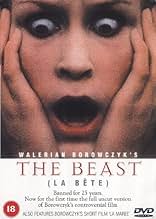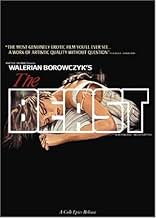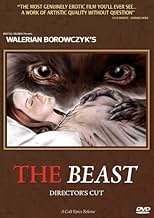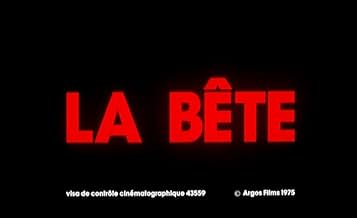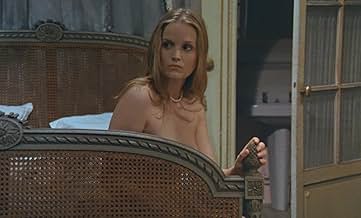On va marier le rejeton d'une châtelain désargenté à une vierge héritière, en cachant qu'il est le fruit d'une relation bestiale, ancienne. Mais ce secret de famille se dévoile dans les rêve... Tout lireOn va marier le rejeton d'une châtelain désargenté à une vierge héritière, en cachant qu'il est le fruit d'une relation bestiale, ancienne. Mais ce secret de famille se dévoile dans les rêves masturbatoires de la fiancée, en la faisant honteusement jouir. [255]On va marier le rejeton d'une châtelain désargenté à une vierge héritière, en cachant qu'il est le fruit d'une relation bestiale, ancienne. Mais ce secret de famille se dévoile dans les rêves masturbatoires de la fiancée, en la faisant honteusement jouir. [255]
- Réalisation
- Scénario
- Casting principal
- Duc Rammendelo
- (as Dalio)
Avis à la une
The long (way too long) scene between an Aristocratic young woman and the supposedly horrifying but the most laughable I've ever seen in the movies creature with truly impressive...well anatomy, is set to the clavichord music of Scarlatti and is hysterical. My husband and I both laughed out loud at the exaggerated details of the encounter. The moral of the scene is - beauty can and will defeat the monster. The question is - who is the target audience for the film? For an erotic picture, it is too verbose; for an art movie - it's got too many jaw-dropping scenes of sheer madness and I'd say an abrupt ending. IMO, the film creator did not mean for it to be a serious drama. As a parody of art house/horror/erotica, it is funny and certainly original. Have a good laugh and try not to look for some deep meaning. This story of the curious Beauties and the lustful Beasts certainly is not recommended for co-viewing with the children. The opening scene that may shock an unprepared viewer much more than the infamous scene of bestiality can be successfully used On Discovery channel for the program like "In the world of animals - mating habits and rituals of horses".
Walerian Borowczyk's La Bête is a seriously grotesque film, but unless you have the patience to make it through about an hour of glacially paced exposition, you won't realize why. In terms of going from zero to one-hundred in terms of plot-escalation, La Bête takes the cake with positioning itself like an ordinary, albeit slightly off-kilter, melodrama about an arranged relationship in a close-knit family, before becoming a zoophiliac's ultimate cinematic desire.
The story opens following the death of a businessman named Philip Broadhurst, who leaves his estate to his daughter Lucy (Lisbeth Hummel) with the only condition being that she be married to a man named Mathurin (Pierre Benedetti) by the brother of Pierre's uncle within the next six months. Despite Mathurin's mental deficiencies and deformities, Lucy still agrees to marry him, with her and her aunt Virginia (Elisabeth Kaza) taking a trip to the Pierre's brother's farmhouse. At the farmhouse, Lucy learns of a two-hundred-year-old fairytale about a beast living in the woods adjacent to the farmhouse.
For about an hour, we endure ostensibly neverending conversation between this enormous family-to-be, none of it really amounting to anything other than frustration due to the lack of human interest and a great deal of pointless sermonizing about family and the marital bond. It isn't until the hour mark that Borowczyk, also the screenwriter here, flips the switch and turns La Bête into something cruelly twisted. Without giving too much away, for much of the final thirty minutes of this film need be experienced, the film involves a dark, twisted dream sequence (or maybe not) of Lucy's intimate, sexual relationship with the aforementioned beast.
Borowczyk doesn't hold back in what he wants the audience to see in La Bête, so much so that he's willing to show us a bear ejaculating and performing cunnilingus on Lucy, resulting in Lucy enduring a series of bloody scratches. No taboo in beastiality is left untouched as the film details some of the most wicked sexual perversions you're likely to see come to life on screen in your life. Me being so young, I feel I have a ways to go, which only works to keep me up at night even more.
As an art film, La Bête is rather tasteful up until its final act. The film is nicely shot, with numerous, intimate camera angles taking the place of the predictable scuzzy aesthetic one would expect this film to have, in addition to having several nicely decorated sets and some solid exterior shots of the forest where much of this action happens. As a pornographic film, La Bête is most artful in a sense, but the porn itself is anything but erotic. It almost feels like shock value, especially when we must endure numerous closeups of a gigantic bear ejaculating repeatedly.
La Bête is a curious oddity, destined to gather dust on the seldom surviving, family-owned VHS stores where ultra-weird, almost unspeakable cult classic, and some just stopping at "cult," films precariously placed on towering shelves. I can almost envision an ordinary, black VHS tape with a color-faded, peeling white label with "The Beast" written in pencil, discolored and sun-damaged to look like simple hashmarks, sitting on the shelf looking unassuming and innocent but bearing quite the visual wallop. That's precisely what La Bête is; a visual wallop not for the faint of heart. I'm sure Lucy herself would say something similar.
Starring: Lisbeth Hummel, Pierre Benedetti, and Elisabeth Kaza. Directed by: Walerian Borowczyk.
The film starts off with a sequence that sees a randy male horse mount a female. This opener puts an exclamation mark on the film and prepares the audience, in some ways, for the incredible, tour de force of eroticism that they are about to see. The scenes which see the beast mate with the woman are gratuitous and shocking, and are bound to offend many people (hence the reason it was banned for over 20 years), but these scenes are not merely an excuse for Borowczyk to shock the viewer; this film has a defining point. As said during the film; the only difference between man and beast is intelligence. Both man and beast have instincts, only man knows how to control them. The Beast explores this difference between man and beast through sexuality; the fantasy sequence in which the beast appears epitomises the control of human desire, and it is only when the central female character lets go of her control that she can see the beast. The film has strong themes of the age-old story of 'beauty and beast' weaved into it, and overall this is a shockingly morbid tale of lust, but not without a moral.
Many criticise the scenes around the film's shocking sex sequences for being boring, but these scenes are important to the film's story. Without these scenes, we wouldn't get to know the characters or the story of the beast, and, most importantly; the story of 'beauty and the beast' would not be able to have it's horrifying conclusion dealt to the audience, and as that is one of the key elements of the film; it would be a real shame. Besides that, Borowczyk keeps his audience entertained through these scenes, not with shocks, but with dialogue and the upper class persona of the family, along with the beautiful shots of the mansion's ground would not be seen, and therefore the stark contrast between that and the events later on in the film would not exist either.
Overall, The Beast is a shocking film. It's portrayal of a taboo subject and the shocking way it is portrayed will ensure that this film is not for everyone. However, if you can get over the film's shock, and embrace The Beast; what awaits is a skilful and beautiful piece of art that should not be missed by anyone that is willing to give this film a chance.
Le saviez-vous
- AnecdotesActor Bryan Pringle once took a date to a screening of La Bête (1975) in London. She was reportedly "appalled by his taste in films."
- Citations
Priest: Spring is the cause of our excitement. We, frail humans, we are like animals, we suffer the laws of nature. Alas!
Pierre de l'Esperance: Happily, we have this intelligence, this heavenly gift, which enables us to fight our instincts.
- Versions alternativesThe film was rejected for UK cinema in 1978 by the BBFC and released on video in 1988 (as "Death's Ecstasy") with around 9 minutes of distributor pre-edits. It was finally passed completely uncut for cinema and video in 2001.
- ConnexionsEdited from Contes immoraux (1973)
Meilleurs choix
- How long is The Beast?Alimenté par Alexa
Détails
- Durée
- 1h 38min(98 min)
- Mixage
- Rapport de forme
- 1.66 : 1





